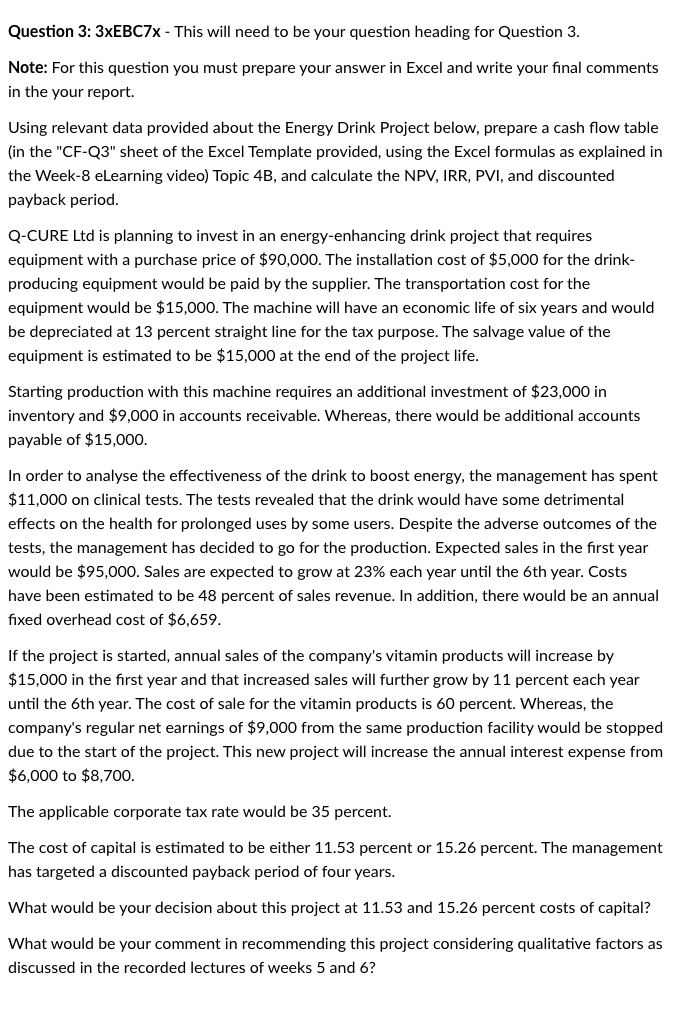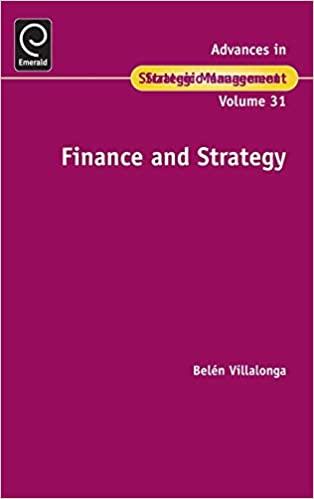
Question 3: 3xEBC7x - This will need to be your question heading for Question 3. Note: For this question you must prepare your answer in Excel and write your final comments in the your report. Using relevant data provided about the Energy Drink Project below, prepare a cash flow table (in the "CF-Q3" sheet of the Excel Template provided, using the Excel formulas as explained in the Week-8 eLearning video) Topic 4B, and calculate the NPV, IRR, PVI, and discounted payback period. Q-CURE Ltd is planning to invest in an energy-enhancing drink project that requires equipment with a purchase price of $90,000. The installation cost of $5,000 for the drinkproducing equipment would be paid by the supplier. The transportation cost for the equipment would be $15,000. The machine will have an economic life of six years and would be depreciated at 13 percent straight line for the tax purpose. The salvage value of the equipment is estimated to be $15,000 at the end of the project life. Starting production with this machine requires an additional investment of $23,000 in inventory and $9,000 in accounts receivable. Whereas, there would be additional accounts payable of $15,000. In order to analyse the effectiveness of the drink to boost energy, the management has spent $11,000 on clinical tests. The tests revealed that the drink would have some detrimental effects on the health for prolonged uses by some users. Despite the adverse outcomes of the tests, the management has decided to go for the production. Expected sales in the first year would be $95,000. Sales are expected to grow at 23% each year until the 6th year. Costs have been estimated to be 48 percent of sales revenue. In addition, there would be an annual fixed overhead cost of $6,659. If the project is started, annual sales of the company's vitamin products will increase by $15,000 in the first year and that increased sales will further grow by 11 percent each year until the 6th year. The cost of sale for the vitamin products is 60 percent. Whereas, the company's regular net earnings of $9,000 from the same production facility would be stopped due to the start of the project. This new project will increase the annual interest expense from $6,000 to $8,700. The applicable corporate tax rate would be 35 percent. The cost of capital is estimated to be either 11.53 percent or 15.26 percent. The management has targeted a discounted payback period of four years. What would be your decision about this project at 11.53 and 15.26 percent costs of capital? What would be your comment in recommending this project considering qualitative factors as discussed in the recorded lectures of weeks 5 and 6 ? Question 3: 3xEBC7x - This will need to be your question heading for Question 3. Note: For this question you must prepare your answer in Excel and write your final comments in the your report. Using relevant data provided about the Energy Drink Project below, prepare a cash flow table (in the "CF-Q3" sheet of the Excel Template provided, using the Excel formulas as explained in the Week-8 eLearning video) Topic 4B, and calculate the NPV, IRR, PVI, and discounted payback period. Q-CURE Ltd is planning to invest in an energy-enhancing drink project that requires equipment with a purchase price of $90,000. The installation cost of $5,000 for the drinkproducing equipment would be paid by the supplier. The transportation cost for the equipment would be $15,000. The machine will have an economic life of six years and would be depreciated at 13 percent straight line for the tax purpose. The salvage value of the equipment is estimated to be $15,000 at the end of the project life. Starting production with this machine requires an additional investment of $23,000 in inventory and $9,000 in accounts receivable. Whereas, there would be additional accounts payable of $15,000. In order to analyse the effectiveness of the drink to boost energy, the management has spent $11,000 on clinical tests. The tests revealed that the drink would have some detrimental effects on the health for prolonged uses by some users. Despite the adverse outcomes of the tests, the management has decided to go for the production. Expected sales in the first year would be $95,000. Sales are expected to grow at 23% each year until the 6th year. Costs have been estimated to be 48 percent of sales revenue. In addition, there would be an annual fixed overhead cost of $6,659. If the project is started, annual sales of the company's vitamin products will increase by $15,000 in the first year and that increased sales will further grow by 11 percent each year until the 6th year. The cost of sale for the vitamin products is 60 percent. Whereas, the company's regular net earnings of $9,000 from the same production facility would be stopped due to the start of the project. This new project will increase the annual interest expense from $6,000 to $8,700. The applicable corporate tax rate would be 35 percent. The cost of capital is estimated to be either 11.53 percent or 15.26 percent. The management has targeted a discounted payback period of four years. What would be your decision about this project at 11.53 and 15.26 percent costs of capital? What would be your comment in recommending this project considering qualitative factors as discussed in the recorded lectures of weeks 5 and 6







